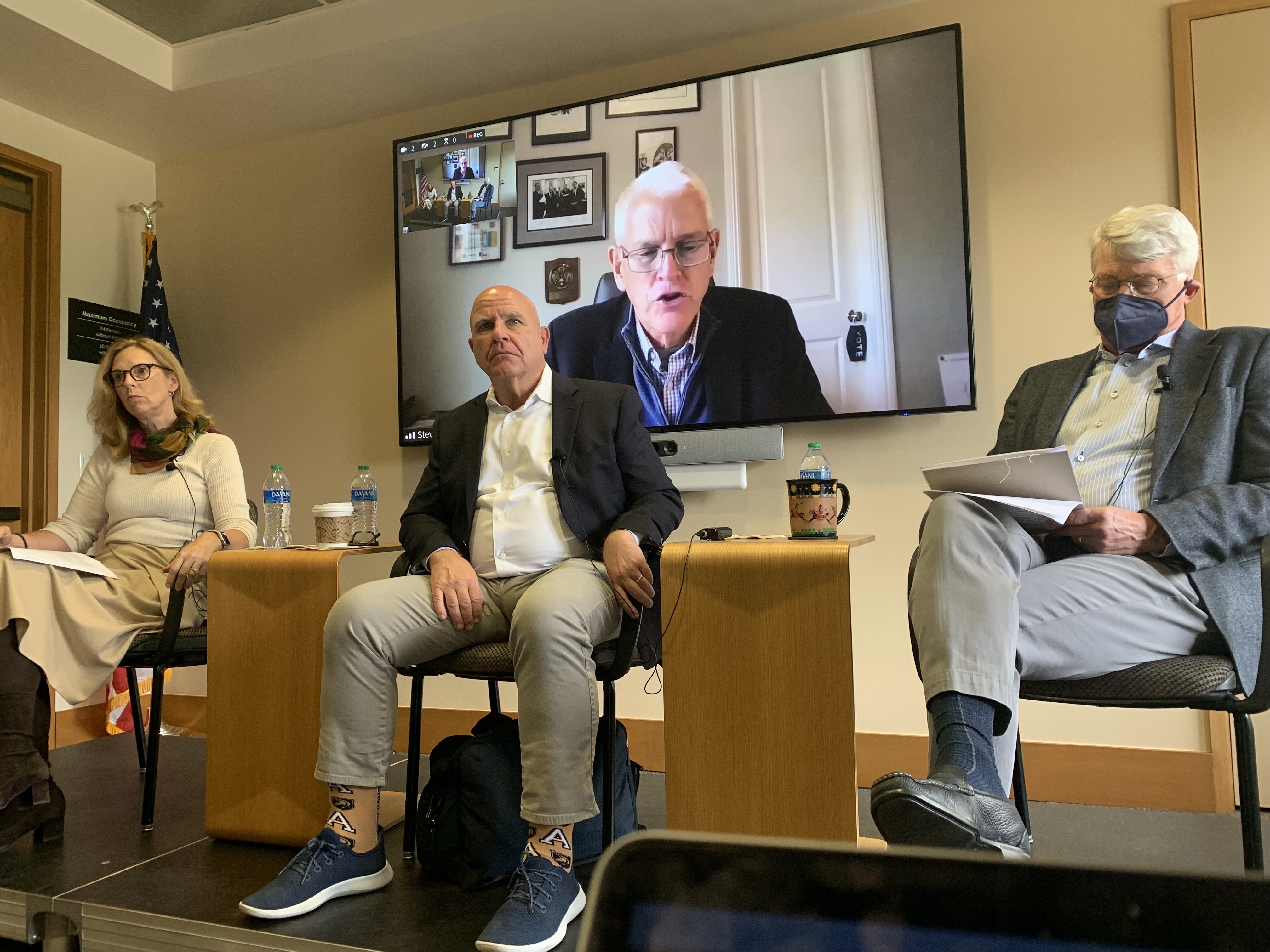The three speakers at Monday’s panel discussion “How the War in Ukraine Could End” — former national security advisor H. R. McMaster, Center on Democracy, Development and the Rule of Law (CDDRL) Director Kathryn Stoner and former U.S. Ambassador to Ukraine Steven Pifer ’76 — had more in common than being seated on the same stage. They began the event by congratulating each other on getting onto “[Vladimir] Putin’s latest list of people who can no longer go to Russia.”
They said that an end to the Russia-Ukraine war is likely to take multiple years and depends upon large-scale political shifts in Russia and military aid to Ukraine.
“I think the most likely way this war ends is years from now, after some sort of fundamental political change in Russia,” McMaster said. “Otherwise, this will be a conflict that will go on.”
Stoner agreed: “The bottom line is that an end is not near, unfortunately.”
Stoner pointed out that “Putin is on a timeline,” due to economic strains and surveys that show increasingly concerned Russian attitudes toward the war. She listed three scenarios she foresaw as potential ends to the war: an unlikely chance Putin is ousted by elites, a social revolution led by young Russians or Putin’s death.
Stoner concluded that any outcome would take months or years to occur, if at all. In the meantime, she urged the global community to intensify sanctions and continue their support of Ukrainians.
McMaster urged attendants to stay engaged in the movements of the war, and keep an eye on the West’s willingness to stay involved, the Ukrainian will to sustain resistance and shifts in Russian politics.
“I think we have to pull out all the stops to give Ukraine support,” McMaster said. “We can get them longer range fire capabilities, long range surveillance capabilities and all the air defense that can fit into that country, including intermediate-range air defense.”
Pifer, who served as U.S. ambassador to Ukraine from 1998 to 2000, said the most likely scenario was a “long war of attrition.” He was in consensus with McMaster and Stoner that increased military support of Ukraine is the way to an end.
Pifer said he also hopes to see a negotiation process take place between both countries, though he acknowledged that Ukraine is not interested in negotiating as Russia has escalated demands to the point where the debate is over how much territory Ukraine should cede.
“The more arms we can provide Ukrainians, the more change they can make on the battlefield that might lead to a change in the Russian position,” Pifer said. “It should be the U.S. and Western goal to either help drive the Russians out or at minimum, reach negotiations that produce a settlement on a truce we accept.”
McMaster and Stoner expanded on their view of the ideological underpinnings of the conflict and Putin’s vision for Russia.
McMaster described Putin as “obsessed” with restoring the Russian Empire and its national greatness to the Soviet-era, referencing the Russian president’s speeches dating from 2007.
“There are some things that are black swans, you know, unanticipated events that have unforeseen consequences,” McMaster said. “Well, the reinvasion of Ukraine was a pink flamingo, right? It was right there in front of all of us for everybody to see.”
McMaster said that although Putin had wanted to invade Ukraine long before Feb. 24, the Russian efforts in the past eight months were “a failure from the very beginning.” He attributed the drawn-out invasion to Putin’s failure to recognize four factors: the strength of Ukrainian national identity, a lack of preparedness for Ukraine’s military prowess, an overestimation of Russia’s military strength and an assumption that the West would not stand up to Russia.
Stoner emphasized that the February invasion by Russia is a reinvasion, following the 2014 invasion of Crimea and the ousting of Ukrainian President Viktor Yanukovych. She explained that Putin is driven by a historical narrative from the 12th century that Kyiv is the “mother of all Russian cities,” and the idea that “all Russian speakers want to be Russian.”
However, Stoner also described an evolution of Putin — agreeing with McMaster that Putin has “embarked on a nation-building project.”
“It’s conservative, Orthodox, illiberal,” Stoner said of the project. “He told us about four or five years ago in an interview in the Financial Times, he was saving Ukraine and Ukrainians from the West. The problem is Ukrainians don’t want to be saved.”
Putin’s portrayal of Ukraine as a threat to the existence of Russia is unrealistic, according to Stoner.
“It’s a threat to the regime of Putin, but not to Russia itself,” Stoner said. “I think he’s conflating the Russian state and its sovereignty with his own regime, because that’s the only way in which Ukraine as a West-ward facing, independent sovereign nation state is a threat to Russia.”
Pifer called the war a “fundamental miscalculation” by the Russian military.
“The Russian military was not immune to the corruption that runs through all Russian institutions,” McMaster said. “There were tremendous logistics failures and frailties within the Russian system. The Russian military has been dealing with table scraps, essentially.”
In northern parts of the country, McMaster said Ukrainian strategies to attack Russian weakness have been effective, while in the south, deliberate counter offensives with new precision firing capabilities could lead to “mass surrenders” from Russia in the next month.
